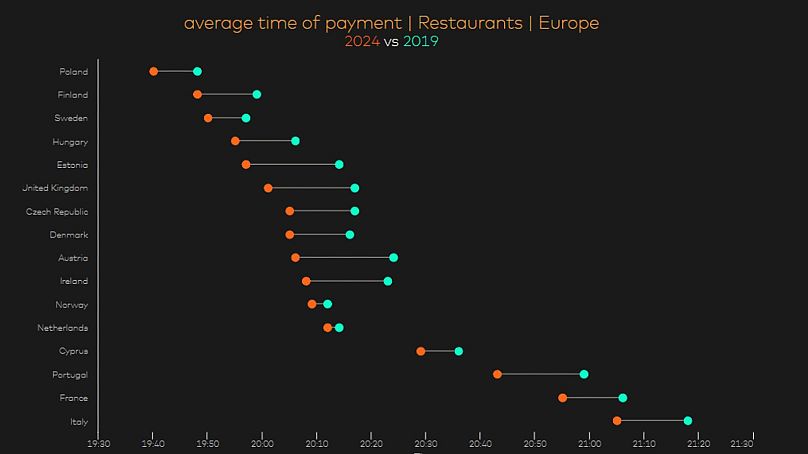A study conducted in 16 countries shows that people are now dining out earlier than in 2019, with new data indicating a growing trend in “early-bird” habits.
People across most European countries are dining out earlier than they did before the pandemic, according to new research from Mastercard.
The most significant shifts were seen in Austria (18 minutes earlier), Portugal (16 minutes), and Ireland (15 minutes).
Dining earlier has several health benefits, including better digestion, reduced cardiovascular risks, and improved blood glucose levels.
On average, Europeans are dining 10 minutes earlier than before.
Previous studies on post-COVID-19 food habits revealed that people across Europe are indeed changing their eating behaviors, with more focus on meal planning and mindful purchasing. There is also a shift away from precooked meals toward “proper meal times” and eating with other household members.
Natalia Lechmanova, chief economist of Europe at the Mastercard Economics Institute, spoke to Euronews about the factors driving this trend.
“One reason is that we are working more flexibly, so we have more control over our schedules and we can decide when we want to go out to eat.”
“The second reason is that consumers are becoming more health-conscious. They prioritise sleep, they go to bed earlier, they sleep longer,” she explained.
COVID-19 has not only affected dining habits.
The research also indicates a change in grocery shopping patterns, with consumers now tending to shop earlier in the week on traditionally quieter days like Monday and Tuesday, rather than during the typical weekend rush seen before the pandemic.
“We are seeing significant shifts in shopping behaviour,” said Natalia Lechmanova.
“Our data highlights that these ‘early-bird’ behaviours are not just trends — they reflect deeper changes in how people prioritise time and experiences,” she added. -euronews




